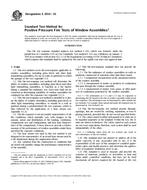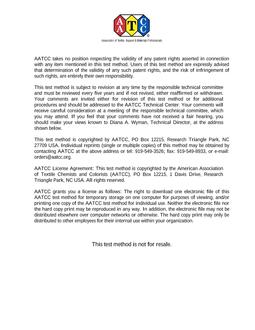
ASTM E2010
Original price was: $58.00.$35.00Current price is: $35.00.
Standard Test Method for Positive Pressure Fire Tests of Window Assemblies (Withdrawn 2007)
| Published by | Publication Date | Number of Pages |
| ASTM | 10/10/2001 | 9 |
ASTM E2010 – Standard Test Method for Positive Pressure Fire Tests of Window Assemblies (Withdrawn 2007)
1.1 This test method covers fire-test-response applicable to window assemblies, including glass block and other light transmitting assemblies, for use in walls or partitions to retard the passage of fire (see Appendix X1).
1.2 This fire-test-response test method will determine the ability of window assemblies, including glass block and other light transmitting assemblies, to function as a fire barrier during a standard fire endurance test. Such tests shall not be construed as determining suitability of window assemblies for continued use after fire exposure (see Appendix X1.2).
1.3 This fire-test-response test method is intended to evaluate the ability of window assemblies, including glass block or other light transmitting assemblies, to remain in a wall or partition during a predetermined fire test exposure, which is then followed by the application of a hose stream (see Appendix X1.3).
1.4 The fire exposure is not necessarily representative of all fire conditions, which normally vary with changes in the amount, nature and distribution of fire loading, ventilation, compartment size and configuration, and heat sink characteristics of the compartment. It does, however, provide a relative measure of fire performance of window assemblies under threse specified fire exposure conditions.
1.5 The hose stream test used in this test method is not designed to be representative of an actual hose stream used by a fire department during fire suppression efforts.
1.6 Any variation from the construction or conditions that are tested will possibly change the performance characteristics of the assembly.
1.7 This fire-test-response standard does not provide the following:
1.7.1 The fire endurance of window assemblies in walls or partitions constructed of materials other than those tested.
1.7.2 A temperature measurement on the unexposed surface of the window assembly.
1.7.3 A measurement of smoke or products of combustion that pass through the window assembly.
1.7.4 A measurement of smoke, toxic gases, or other products of combustion generated by the window assembly.
Note 1 – The information in 1.7.3 and 1.7.4 may be important in determining the fire hazard or fire risk of window assemblies under actual fire conditions. This information may be determined by other suitable fire test methods. For example, flame spread and smoke development may be determined by Test Method E 84.
1.8 The fire-test-response test method permits through-openings, that are created by cracking, separation, or loss of glazing material, provided they do not exceed specified limits.
1.9 The values stated in either inch-pound or SI units are to be regarded separately as the standard. Within the text, the SI units are shown in brackets. The values stated in each system are not exact equivalents; therefore, each system shall be used independently of the other.
Note 2 – Combining values from the two systems may result in non-conformance to this test method.
1.10 This standard does not purport to address all of the safety concerns, if any, associated with its use. It is the responsibility of the user of this standard to establish appropriate safety and health practices and determine the applicability of regulatory limitations prior to use.
1.11 This standard is used to measure and describe the response of materials, products, or assemblies to heat and flame under controlled conditions, but does not by itself incorporate all factors required for fire hazard or fire risk assessment of the materials, products, or assemblies under actual fire conditions.
1.12 The text of this test method references notes and footnotes which provide explanatory material. These notes and footnotes (excluding those in tables and figures) shall not be considered as requirements of this test method.
Product Details
- Published:
- 10/10/2001
- Number of Pages:
- 9
- File Size:
- 1 file , 97 KB
- Note:
- This product is unavailable in Russia, Ukraine, Belarus



